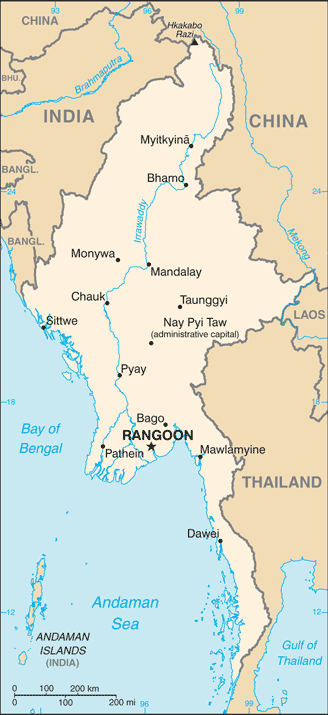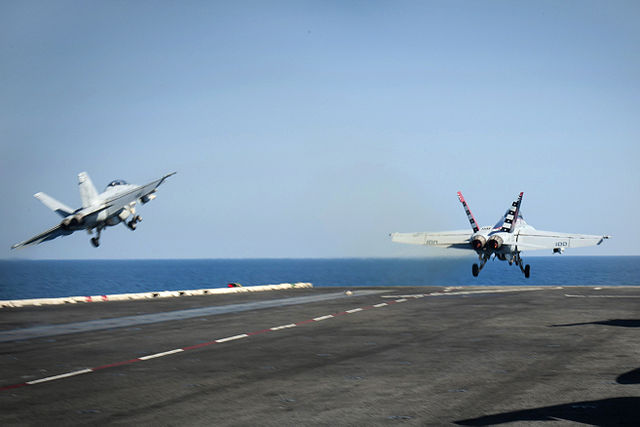 This week the Pentagon says that earlier this month it killed Muhsin Al-Fadhli, the leader of the (purportedly real) “Khorasan Group” — alleged to be a Syrian-based outpost of al-Qaeda’s central command — in an airstrike in Syria.
This week the Pentagon says that earlier this month it killed Muhsin Al-Fadhli, the leader of the (purportedly real) “Khorasan Group” — alleged to be a Syrian-based outpost of al-Qaeda’s central command — in an airstrike in Syria.
There’s a big problem, though. This is at least the THIRD time, the United States has supposedly killed Muhsin Al-Fadhli in an airstrike in Syria. An International Business Times article from September 28, 2014 reported that he had just been killed by a U.S. airstrike in Syria, but also that he had been previously reported to have been killed by a U.S. airstrike in Syria.
Possibly the bigger problem, though, is that it’s still unclear the group he supposedly leads actually … exists.
Let’s look back at the puzzling framing of other articles from September 2014 about U.S. airstrikes in Syria targeting the group.
New York Times – September 20, 2014:
American officials said that the group called Khorasan had emerged in the past year […]
There is almost no public information about the Khorasan group, which was described by several intelligence, law enforcement and military officials as being made up of Qaeda operatives from across the Middle East, South Asia and North Africa. Members of the cell are said to be particularly interested in devising terror plots using concealed explosives. It is unclear who, besides Mr. Fadhli, is part of the Khorasan group.
[…]
Ayman al-Zawahri, the head of Al Qaeda, anointed the Nusra Front as its official branch in Syria and cut ties with the Islamic State early this year after it refused to follow his orders to fight only in Iraq. Officials said that Khorasan was an offshoot of the Nusra Front.
The Washington Post – September 22, 2014:
In addition to a broader campaign of airstrikes against Islamic State targets across Syria on Monday night, the United States also pounded a little-known, but well-resourced al-Qaeda cell that some American officials fear could pose a direct threat to the United States.
The Pentagon said in a statement early Tuesday morning that U.S. warplanes conducted eight strikes west of Aleppo against the cell, called the Khorasan Group, targeting its “training camps, an explosives and munitions production facility, a communications building and command and control facilities.”
And then there was Buzzfeed’s excellent report (9/23/14) by Rosie Gray, headlined “How ‘Khorasan’ Went From Nowhere To The Biggest Threat To The U.S.” I think this one line about sums up how absurd this sudden appearance of another supposedly existential, imminent threat is:
“I knew about the group a year ago from the media but didn’t know the name or personalities until the past few days — again from the media,” said Will McCants, a terrorism analyst and fellow at the Brookings Institution.
Most of the other experts quoted either instinctively suggested this group is a huge threat (because of course they do) or said it’s borderline made-up.
Then, on November 14, 2014, the LA Times reported more airstrikes — officially undertaken against “Khorasan,” but which seemed to hit an awful lot of major Nusra Front facilities. And one big issue leapt out:
Many opposition activists in Syria and elsewhere doubt the existence of Khorasan, contending that the targets being attacked are actually Al Nusra Front strongholds. Last week, as Centcom announced the second round of strikes on Khorasan positions, opposition activists said warplanes had hit the headquarters of Al Nusra Front and Ahrar al Sham, another hard-line rebel group with Al Qaeda links.
To recap all of this: The purported organization only came into public knowledge hours before it was first attacked by the U.S. military in September, and locals say it does not exist and is solely a made-up front for unofficially targeting the popular and very real and very large Nusra Front of al-Qaeda in Syria, while suggesting some sort of distinction between the internationalist and Syria-facing segments of Qaeda’s presence in the country that isn’t really there.
(Nusra Front, incidentally, is now openly coordinating closely with and even commanding the U.S.-backed and outmatched “Free Syrian Army.”)
And our leaders, public officials, and media outlets are — by and large — just rolling along with this fairly transparent and repeatedly invalidated fiction.
Back to this week’s news. Here’s a “interesting” assessment of the supposed assassination of the supposed group’s supposed leader:
“A seasoned, knowledgeable and dangerous terrorist who actively sought to harm the United States and its allies has been taken off the battlefield for good,” said Rep. Adam Schiff, the top Democrat on the House Intelligence Committee, noting that al-Fadhli will not be easily replaced.
Except, I suppose, if he replaces himself with himself if he’s still not dead.





 This week
This week 
 I’m always fascinated by the way language and available terminology shapes our worldview — literally causing us to view the world fundamentally differently from our fellow people if they grew up with a very different language. In international politics, these differences crop up from time to time in the news.
I’m always fascinated by the way language and available terminology shapes our worldview — literally causing us to view the world fundamentally differently from our fellow people if they grew up with a very different language. In international politics, these differences crop up from time to time in the news. 